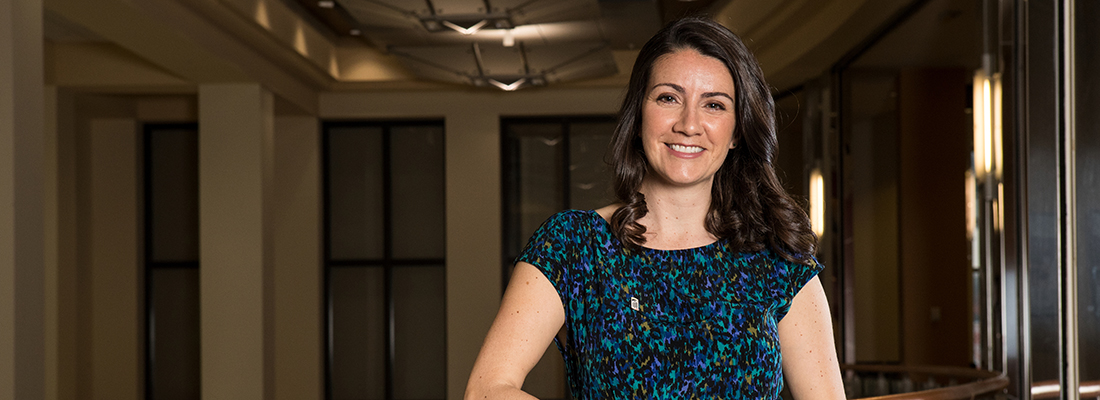Nicole Mattocks, MSW ’10 | University of Maryland School of Social Work
View Full 2017-2018 Champions of Excellence Gallery Find Out More About the Champions of Excellence Campaign
In 2009, as a University of Maryland School of Social Work student, Nicole Mattocks interned with a community development organization in Northeast Baltimore. Shortly after earning her Master of Social Work in May 2010, Mattocks worked at a local high school in West Baltimore.
It didn’t take long for her to realize how different the two neighborhoods were.
“The physical environment was drastically different … and the really stark contrast struck me,” says Mattocks, who now is pursuing her PhD at the University of Maryland, Baltimore (UMB). “There was not nearly as much green space in Harlem Park [West Baltimore]. It wasn’t as well-kept [as Northeast Baltimore], with a lot of broken glass and trash. There were all these signs of what’s called physical disorder — graffiti, litter, vacant and abandoned buildings.”
Her mind bursting with knowledge from her coursework, Mattocks wondered how living in these conditions might affect a person’s well-being. Through her years of studying at UMB, she had gained a base knowledge about how having access to green spaces and healthy, safe environments leads to overall positive community health.
“I started thinking that there’s got to be a connection between growing up in this concrete jungle where everything’s falling apart and one’s experience and perception of the world,” she says. “That was the beginning of being interested in the relationship between the physical environment and all kinds of outcomes.”
Now, as she completes her doctorate in social work, she has focused her dissertation on the relationship between the physical environment and urban green spaces of Baltimore’s neighborhoods and mental health outcomes, such as depression and anxiety.
Mattocks was a logical fit for an opportunity that arose when two School of Social Work faculty, Caroline Burry, PhD, MSW, and Carolyn Tice, DSW, MSW, applied for a grant to develop an environmental social work course. The aim was to design a course that would be taught at both UMB and at its sister school, Rajagiri College of Social Sciences, in India. The faculty needed someone to go to India to gather information about what environmental social work looked like and what environmental challenges were most important to the people in that region. Burry and Tice chose Mattocks.
For two weeks, she visited Indian environmental groups and agencies, learning about their needs and brainstorming ways to incorporate an environmental social work course into the college’s curriculum.
“The experience was really interesting because I had never traveled to a developing country before,” she says. “There’s not a lot of infrastructure in place to manage the environment there. They don’t even have trash pickup. There aren’t organized processes there in the way that we have, and take advantage of, here [in the United States].”
But Mattocks is quick to add that the problems with the environment in India have nothing to do with the community’s lack of caring.
“I talked to so many people who cared about the environment. There are these grass-roots initiatives to develop nonprofits and organizations to manage recycling and trash pickup,” she says. “It was more that the government didn’t prioritize the environment or that there weren’t enough resources.”
Mattocks worked closely with professors Burry and Tice to add her knowledge from India into the course curriculum. She hopes to see the final product of their efforts by spring 2019, when the course is piloted on both campuses — UMB and Rajagiri.
As she prepares for graduation in May 2019, Mattocks is open to a future working in either an academic or non-academic job.
“If I end up at a research institution studying the environmental impacts on health, I would like that,” she says. “I definitely want to stay local; I like the Baltimore region because it’s such a good place to do research.“
Mattocks, who was born in Prince George’s County and raised in Ellicott City, says her experience at UMB is, without a doubt, a contributor to her love of Baltimore.
“It’s nice to be in an environment where everyone is working on a professional degree,” she says. “There are a lot of faculty to work with in other disciplines and good opportunities for interdisciplinary research. Baltimore has many needs and a lot of populations we can serve. It’s the perfect location.”



